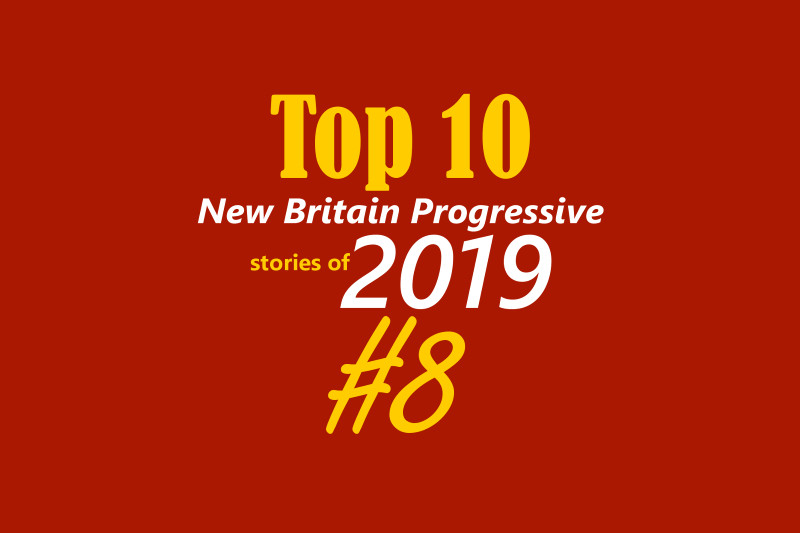Many important stories have been covered by the New Britain Progressive in 2019. It may be difficult to name only a few articles as the top stories of the year, but there are a few the New Britain Progressive would like to share as our Top Ten. Other Top Ten stories can be found at “Top Ten Stories of 2019.”
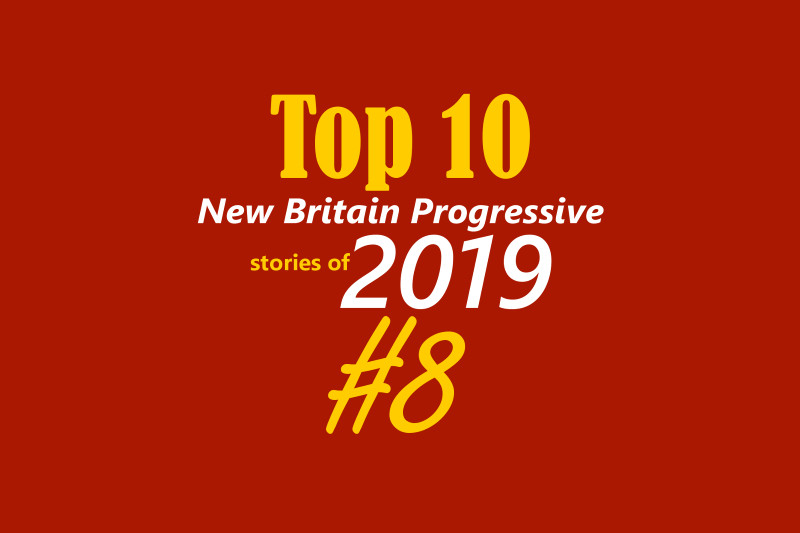
The process leading to the city budget approved during 2019 started out with controversy, included a one-time education increase and then ended, again, in controversy.
The budget debate leading to the Fiscal Year 2020 budget, the budget in effect from July 1, 2019 to June 30, 2020, began when City Council Democrats proposed a resolution opposing the budget proposed by Republican Mayor Erin Stewart’s Finance Commission. The Council Democrats said that Stewart’s, “Board of Finance and Taxation proposed a $13,390,779 general fund budget increase, which would raise the mill rate by 5 mills and increase property taxes within the City by nearly 10%.” (Democrats Oppose $13M City Hall Budget Increase.)
After that, whether or not it was in reaction to the Council Democrats’ resolution, when Stewart issued her Mayor’s Proposed Budget, it not only contained no increase in the mill rate but also an assumption that the city would pass on to the school district a state grant that has previously been counted as revenue in the city’s budget.
Estimated at $3.1 million in the Fiscal Year 2019 city budget, the change amounted to a structurally one-time increase in city funding for education. Amounting to the largest increase in city education funding during Stewart’s administration, it appears to only partially offset the years in which the city, under Stewart, did not provide an increase in city support for the city’s schools. The change apparently left her administration’s support for local schools increasing less than one percent per year over the six years of her administration. (Stewart Budgets One Time Revenue and School Funding.)
While the budget remained controversial and most Council Democrats voted against it, the Council approved it. (Council Approves Stewart Budget Plan 10-5.) But that approval was not the end of the budget controversy.
Later in the year, in a campaign mailing, Stewart made an apparently false claim that she, “Increased education funding in the 2019-20 budget by more than $7 million,” as opposed to the apparent actual one-time increase in annual operating education funding of closer to $3.1 million. That claim also shed a spotlight, not only on the larger issue of the paucity of annual city support, under Stewart, for New Britain schools, but the apparent correlation of that to low school test scores in the city. (Is Stewart Education Claim Untrue?)
The Fiscal Year 2020 budget debate was the second year of a controversial budget process, under a City Hall with a Republican mayor and Democratic-majority Council. The two year term had vigorous debates on the level of property taxation, the amount of city support for New Britain’s schools and other issues. In the short run, the City Charter budget process that gives advantage to the mayor left Stewart’s budget policies in effect. Few think, however, the debates over city budget priorities are settled.
But the debates leading to the Fiscal Year 2020 city budget did make the story #8 on the New Britain Progressive‘s Top Ten Stories of 2019.
Democrats Oppose $13M City Hall Budget Increase
March 23, 2019
City Council Democrats have proposed a resolution opposing a $13 million budget increase proposed by Republican Mayor Erin Stewart’s city Finance Board.
The resolution calls for investments in education and public safety.
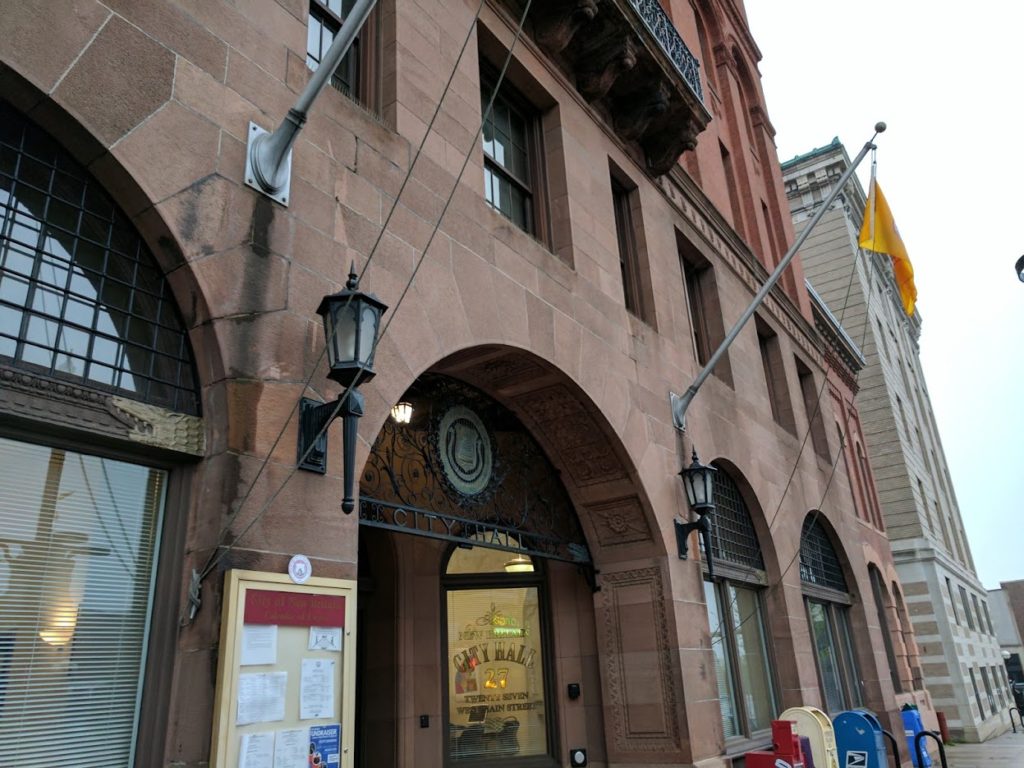
On March 5, 2019, the city Board of Finance and Taxation, which is appointed by Stewart, proposed a city budget that would increase spending by $13,390,779.
The proposal is for the upcoming budget year that runs from July 1, 2019 to June 30, 2020.
While increasing the city budget from $237,729,089 to $251,119,868, the Board of Finance’s proposal would freeze the schools allocation for yet another year. The city budgets under Stewart have not increased funding for city schools since the budget approved in 2016, and her Finance Board’s plan would extend that freeze in education support to a third straight year.
But, Council Democrats say that Stewart’s, “Board of Finance and Taxation proposed a $13,390,779 general fund budget increase, which would raise the mill rate by 5 mills and increase property taxes within the City by nearly 10%.”
The resolution that the nine Council Democrats are proposing says that, “such a large tax increase would have detrimental effects on residents throughout the City, many of whom are already struggling to cope.”
Council Democrats says that, “Common Council members strongly oppose any rate increase until spending has been curtailed and accountability established,” saying that they have, “put forward a resolution requiring the Mayor to deliver an honest, transparent and balanced budget, which would include the reduction in spending.”
The resolution would require, “that the proposed budget the Mayor compiles be balanced, provide for payments of hard debt, medical self-insurance funding, public safety funding and appropriate education funding to benefit the upstanding youth of our community and all of New Britain. “
After the Board of Finance recommends a city budget, the mayor is responsible under the City Charter for proposing her own budget plan to the Council.
While the Council is then technically able to approve a budget different than the mayor’s proposal, the mayor can veto it. Unless that Council can overturn the mayor’s veto by a deadline fixed in the City Charter, the mayor’s budget takes effect without the Council’s approval.
Since “overriding” a veto takes the support of ten of the fifteen Council members, and there are nine Democrats and six Republicans, Stewart and the Council Republicans can block the Democrats from approving their own budget plan.
That is effectively what happened last year, making the city budget currently in effect, with a tax increase and a freeze in education funding, entirely the decision of Stewart and not Council Democrats.
The Democrat’s resolution is on the agenda of the March 27, 2019 Council meeting, which begins at 7:00pm in City Hall.
Stewart Budgets One Time Revenue and School Funding
April 11, 2019
Republican Mayor Erin Stewart has submitted a budget that appears to use one time revenue to keep taxes level and pass a state grant on the city schools.

Stewart’s budget plan appears to rely heavily on one-time revenue. Her budget would transfer $2 million from the city’s fund balance and another $2.9 from other funds, use $3.5 million from ban/bond premiums and count on $2.5 million in sale of property.
While Stewart’s budget would keep the city property tax mill rate at 50.50, her budget still anticipates $2.8 million more in tax revenue than the current year budget.
Keeping the mill rate the same for the upcoming budget year appears to mean that current year property taxes will have increased by $26 million under the six years of Stewart’s administration.
Stewart’s budget plan reportedly transfers to the school system the money from a grant that the state provides to the city to support special education. That grant is budgeted by the city for $3.1 million in the current year, money that would, reportedly, now be passed on the school district.
The change would partially offset the years in which the city, under Stewart, did not provide an increase in education funding. Stewart’s budget plan for the upcoming year appears to leave her administration’s support for local schools increasing less than one percent per year over the six years of her administration.
The funds would provide an increase in funding for city’s schools for the upcoming budget year. But the plan appears to only increase support for local schools one year, since the grant would likely be a similar amount for years going forward.
However, because the state special education grant is based on the actual special education expenses of the school district, it is difficult to predict what the actual amount of funding the schools would receive.
Stewart’s budget would take effect for the budget year that begins July 1, 2019 and continues to June 30, 2020 and would set the mill rate that would set property tax levels for tax bills due in July of this year and January of 2020.
The City Charter provides that the City Council will hold at least one public hearing on Stewart’s budget plan.
Council Approves Stewart Budget Plan 10-5
May 29, 2019
The City Council has approved Republican Mayor Erin Stewart’s budget plan for the upcoming budget year, with ten Council members voting in favor and five opposing.
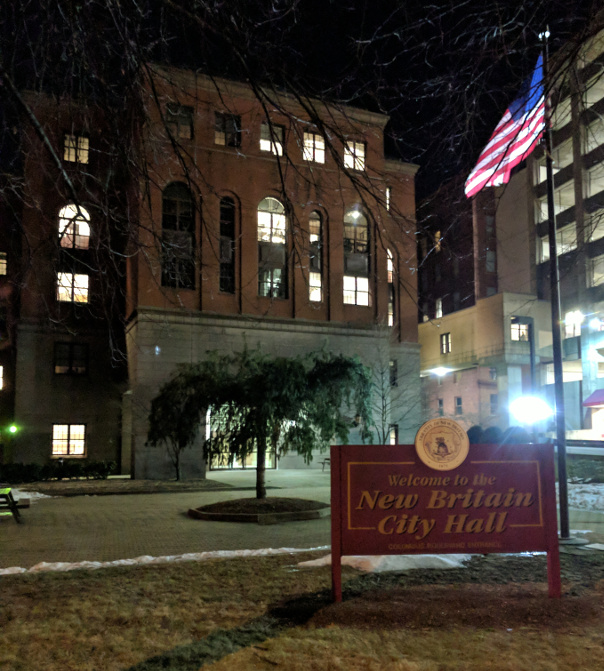
The vote was at a special meeting on May 29, 2019.
Five of the nine Council Democrats voted in opposition to the budget plan. But Council Democrats saying that they were voting in favor of the plan expressed frustration with the budget and a sense of resignation that any alternative they offered could not be approved over a Stewart veto.
Whether the Council approved or disapproved was largely seen as irrelevant, since Stewart’s budget plan would have taken effect with or without Council approval.
While the Council is technically able to approve a budget different than the mayor’s plan, the mayor can veto it. Unless the Council can overturn the mayor’s veto by the deadline in the City Charter, the mayor’s budget takes effect without the Council’s approval.
Since “overriding” a veto takes the support of ten of the fifteen Council members, and there are nine Democrats and six Republicans, Stewart and the Council Republicans can block the Democrats from approving their own budget plan if Stewart disagrees with it.
That is effectively what happened last year, a fact cited by Council Democrats at the meeting.
Stewart’s budget plan appears to rely heavily on one-time revenue. Her budget would transfer $2 million from the city’s fund balance and another $2.9 from other funds, use $3.5 million from ban/bond premiums and count on $2.5 million in sale of property.
Stewart’s budget plan for the upcoming year would apparently transfer a state education grant of perhaps $3.1 million to the school system. While that would appear to represent her own largest single year increase for city schools, her previous years of flat-funding would appear to leave her support for local schools with less than a one percent per year increase over the six years of her administration.
Stewart has come under heavy criticism for repeatedly freezing the amount of money that the city allocates locally to its schools, despite millions of dollars in increases in funding for City Hall departments.
New Britain has low academic test scores and low local funding for its schools. Statewide data apparently shows a general correlation between how much a city or town provides in local funding for their schools and the test scores of the students in their schools.
Stewart’s budget would keep the city property tax mill rate at 50.50 for the upcoming budget year, which would apparently leave current year property taxes $26 million higher under the six years of Stewart’s administration.
The taxing and spending plan takes effect for the budget year that begins July 1, 2019 and continues to June 30, 2020. The budget also sets the mill rate for property tax tax bills due in July of this year and January of 2020.
Is Stewart Education Claim Untrue?
November 3, 2019
Republican Mayor Erin Stewart’s claim that she increased schools funding by “more than $7 million” does not appear to be supported by the facts in her budget.

City education funding, the amount of money that the city allocates from local taxes to fund the regular annual budget of the city’s schools, has become an issue for New Britain. The New Britain Progressive reported that the low amount of education funding provided by the city government appears to be correlated with low school test scores in New Britain.
In a campaign mailing, Stewart claims to have, “Increased education funding in the 2019-20 budget by more than $7 million.”
But the budget proposed by Stewart and approved by the Council allocates no additional funding in the city’s budget line for the annual operation of New Britain’s schools for the 2019-20 budget year. This is the local part of the funding that determines, among other things, how many teachers that the school district can hire to keep class sizes smaller, allowing teachers to devote more time to each child’s education.
Stewart did, however, propose, and the Council approved, a transfer to the school system of the money from a grant that the state provides to the city to support special education. That special education grant was estimated to be $3.1 million in the 2018-19 city budget. That money, now being passed on the school system, would be the single largest increase in annual operating education funding Stewart has provided to city schools in her six years as mayor.
Yet, it is considerably less than the $7 million increase claimed in Stewart’s campaign mailing.
In addition, even if that grant were continued to be transferred to the school district in future years, it appears that it would still remain at similar levels from from year to year, making the passing of this grant to the school district this year inherently a one-time increase.
But even this one time increase would also still leave Stewart’s local school operating funding at less than 1% more per year over the six years of her administration. Stewart has come under heavy criticism for repeatedly freezing the amount of money that the city allocates locally to its schools, despite millions of dollars in increases in funding for City Hall departments.
The New Britain Progressive reported in May that, despite New Britain receiving, “the fifth highest state Education Cost Sharing grant funding of all of the cities and towns in the state,”
New Britain’s own local commitment to education, on the other hand, is among the lowest municipal school districts in the state. Only Bridgeport allocated less local funding per student than New Britain in the 2015-2016 state data.
While New Britain residents have less money than the state average to fund local services, the New Britain Progressive reported that, even looking at a percent of the city’s ability to pay, the city of New Britain still appeared to allocate to its schools, “the second lowest among municipal school districts in the state.”
The New Britain Progressive also reported that,
Comparing the amount of local support for education, using the 2015-2016 data, to the most recent academic test scores appears to show a general correlation between how much a city or town provides in local funding for their schools and the test scores of the students in their schools. The comparison appears to show New Britain’s place near the bottom of both local education funding and test scores as part of a larger pattern, with New Britain near the low end of the scale.
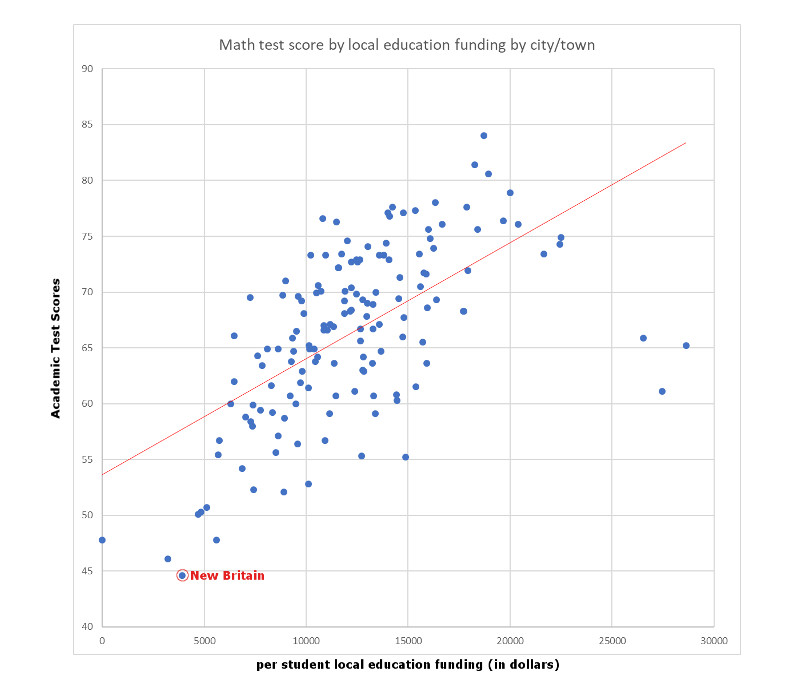
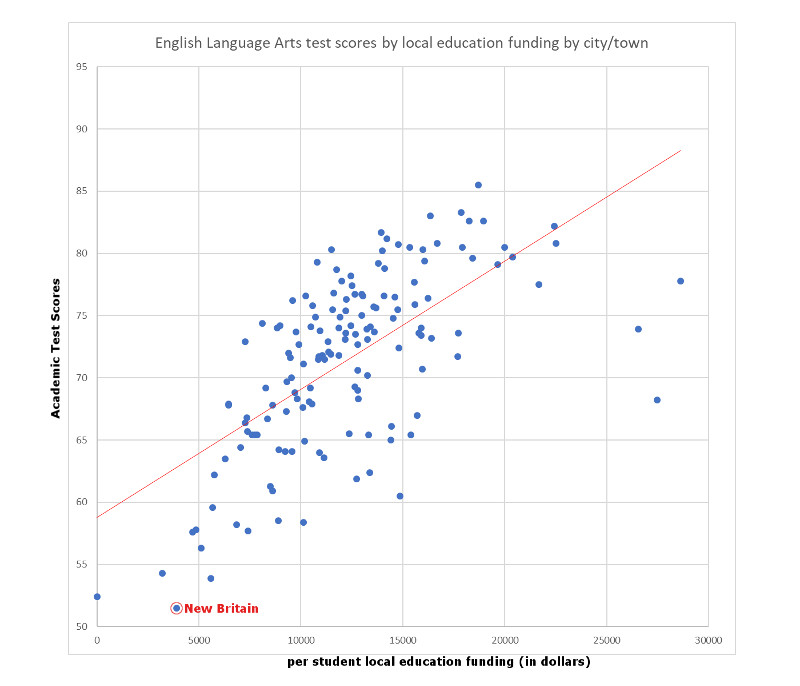
The New Britain Progressive reported that it would appear to take a $14 million per year increase from the city to get the city up to the average amount cities and towns spent as a portion of their local ability to pay three years ago, apparently leaving New Britain’s city commitment to annual school operating budgets far behind the benchmarks that appear correlated with higher educational outcomes.
The state Educational Cost Sharing Grant funding for New Britain schools was increased by the state legislature by $4,073,149 for the 2019-20 budget year.

